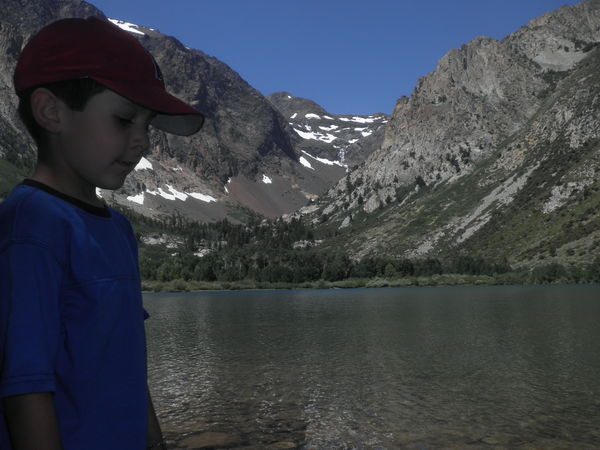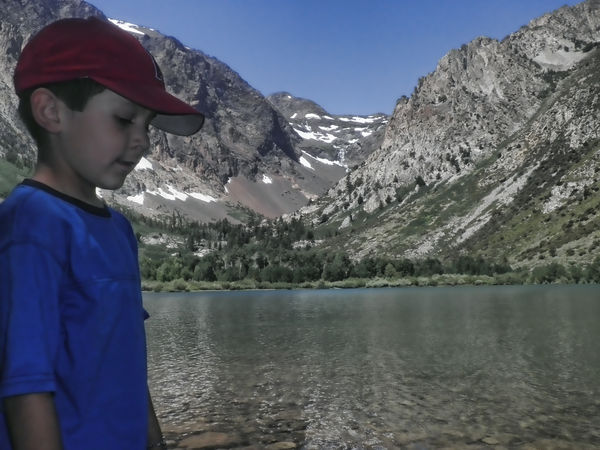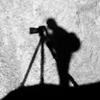HDR is the future (very short essay)
Jun 25, 2013 09:42:42 #
Hello fellow Hoggers. If you take a minute to read this, I would appreciate reading your thoughts on HDR.
I got my first SLR as a teen in the 70s, an Olympus OM-2. It had auto exposure as well as full manual control, and I felt pressured to use manual quite a bit because many older photography purists at the time thought that auto exposure was not real photography (and from the title of this post you should see where this is going.) A few years later, autofocus started becoming mainstream but I staunchly resisted that nonsense it wasnt true photography, removing a key element of picture-taking. Times change. How many of us today shoot manual everything? The same good/bad has been said of digital vs. film, and of digital post processing (although back in the day we all post processed in the darkroom and that was okay.) Photography evolves.
Why is there such resistance to HDR photography? Granted, it can go a bit far, creating a surrealistic image, but such images belong in a different category and they are not the topic of this post. Used properly, HDR will enhance a photographers ability to accurately capture an image just as auto exposure, auto focus, and digital have done.
A good camera with good dynamic range (without HDR) can capture about three f-stops of range, while the human eye can discern about eleven at least three times more than a photograph. So why should we limit our photos to a small portion of what was there for the taking? If we deny ourselves HDR because its not natural, shouldnt we also deny ourselves any aperture smaller than about 3.0 because small apertures allow our photos a greater depth of field than the eye can naturally see? Of course we shouldnt. Like long depth of field, HDR allows us to capture all of the elements that we could see naturally when looking around at what we were there to shoot, with our eyes focusing on one thing or another and adjusting to the brights and shadows.
I am new to HDR, and I am surprised at the amount of resistance to it that Ive been reading as I research it. I downloaded Topaz Adjust last night to play with, and the two images Im posting are of my son a few years ago (taken with a lightweight p&s while backpacking in the high Sierras). The shot would have been wasted without post work to lighten my son, so I had a choice of adjusting brightness and washing out the background, time-consuming Photoshop, or one-click pseudo-HDR with Topaz. This is a good example of the benefit of HDR, and Im now playing with in-camera HDR with my new Olympus SZ-31mr and with bracketed shots in PhotoMatrix.
Just as all cameras now have auto exposure and autofocus, one day all cameras will have HDR.
I got my first SLR as a teen in the 70s, an Olympus OM-2. It had auto exposure as well as full manual control, and I felt pressured to use manual quite a bit because many older photography purists at the time thought that auto exposure was not real photography (and from the title of this post you should see where this is going.) A few years later, autofocus started becoming mainstream but I staunchly resisted that nonsense it wasnt true photography, removing a key element of picture-taking. Times change. How many of us today shoot manual everything? The same good/bad has been said of digital vs. film, and of digital post processing (although back in the day we all post processed in the darkroom and that was okay.) Photography evolves.
Why is there such resistance to HDR photography? Granted, it can go a bit far, creating a surrealistic image, but such images belong in a different category and they are not the topic of this post. Used properly, HDR will enhance a photographers ability to accurately capture an image just as auto exposure, auto focus, and digital have done.
A good camera with good dynamic range (without HDR) can capture about three f-stops of range, while the human eye can discern about eleven at least three times more than a photograph. So why should we limit our photos to a small portion of what was there for the taking? If we deny ourselves HDR because its not natural, shouldnt we also deny ourselves any aperture smaller than about 3.0 because small apertures allow our photos a greater depth of field than the eye can naturally see? Of course we shouldnt. Like long depth of field, HDR allows us to capture all of the elements that we could see naturally when looking around at what we were there to shoot, with our eyes focusing on one thing or another and adjusting to the brights and shadows.
I am new to HDR, and I am surprised at the amount of resistance to it that Ive been reading as I research it. I downloaded Topaz Adjust last night to play with, and the two images Im posting are of my son a few years ago (taken with a lightweight p&s while backpacking in the high Sierras). The shot would have been wasted without post work to lighten my son, so I had a choice of adjusting brightness and washing out the background, time-consuming Photoshop, or one-click pseudo-HDR with Topaz. This is a good example of the benefit of HDR, and Im now playing with in-camera HDR with my new Olympus SZ-31mr and with bracketed shots in PhotoMatrix.
Just as all cameras now have auto exposure and autofocus, one day all cameras will have HDR.
Original, blacked-out son

HDR, one-click with Topaz Adjust

Jun 25, 2013 10:03:14 #
I think the 'resistance' to HDR is mostly against the examples that include a lot of strong tone-mapping, and NOT the "True" HDR which is simply the 'merging' of several shots at different exposures.
Personally, I feel there are proper uses of each 'style' and have used both at times. I do like the in-camera HDR, plus the "iContrast" setting that expands the tonal range captured.
Your example is a good example of software enhancement expanding the tonal range.
Personally, I feel there are proper uses of each 'style' and have used both at times. I do like the in-camera HDR, plus the "iContrast" setting that expands the tonal range captured.
Your example is a good example of software enhancement expanding the tonal range.
Jun 25, 2013 10:03:59 #
That is true, it is here to stay and like every other tool that we have for photography, if used correctly, it will give stunning images. Now, who is to tell us as artists, which is correctly used? Photography is subjective so, you are going to get the "purists" point of view but can we really say that they are really purist (no post processing, no bumping up the saturation/contrast, just using the images straight from the camera? That is a true purist for me). I have even did a little experiment to see if anybody really can spot an HDR image or not: http://www.uglyhedgehog.com/t-71328-1.html
The results from people was very varied. I like HDR images and they have their purpose, style, and beauty... You have to remember that beauty is in the eye of the beholder.
The results from people was very varied. I like HDR images and they have their purpose, style, and beauty... You have to remember that beauty is in the eye of the beholder.
Jun 25, 2013 10:55:27 #
You make a lot of good points. I think when done right it really makes the photo pop. Since there is so many ways to go when you are a photographer, who is to say you are doing it wrong just because the do not like your technique. Happy shooting.
Jun 25, 2013 11:27:29 #
Absolutely agree, beauty is truly in the eye of the beholder. When I visit a gallery, either brick and mortar, out door, or a online gallery. I can appreciate that it's still art whether I appreciate or like it or not.
Then there are the purists, I guess there are some that still rue the day that they stated using electric guitars in country music.
For me the strangest thing is when folks visit the HDR section, and begin their reply with " I don't like HDR" Well then don't visit the HDR section. It's kind of like a vegetarian visiting a steak house.
Then there are the purists, I guess there are some that still rue the day that they stated using electric guitars in country music.
For me the strangest thing is when folks visit the HDR section, and begin their reply with " I don't like HDR" Well then don't visit the HDR section. It's kind of like a vegetarian visiting a steak house.
Jun 26, 2013 00:38:15 #
It is a poor aesthetic and getting tired. I really don't see the second image as being any better.
Jun 26, 2013 01:20:18 #
Darkroom317 wrote:
It is a poor aesthetic and getting tired. I really don't see the second image as being any better.
Must have been looking with your eyes closed. We're not talking about a masterpiece, but just a simple snapshot memory of good times - and now we can see the lake and my son beside it. Hooray for HDR!
Jun 26, 2013 05:32:45 #
duane13 wrote:
Hello fellow Hoggers. If you take a minute to read this, I would appreciate reading your thoughts on HDR.
I feel that HDR is a great tool and certainly has it's place in PP, but that is all. SS
Jun 26, 2013 05:59:32 #
HDR is good for landscapes, indoor architecture and other stationary items if done correctly to where it does'nt look noisy but like a natural photo, but its not appropriate for everything. the whole point of it is to get full range of light and detail in highlights and shadows, but many times it not done right and looks crappy so its getting a bad rap in some respects.
Jun 26, 2013 06:25:54 #
duane13 wrote:
...Just as all cameras now have auto exposure and autofocus, one day all cameras will have HDR.
I guess it depends on what you mean by HDR - post-processing of one or more images or improved dynamic range for digital sensors.
Digital still cannot match the wide dynamic range of films like Portra 400 or T-grained black and white films. This may explain why those of us who still love film seem underwhelmed by HDR.
Neither film nor digital can accommodate the dynamic range of nature on a clear day.
On the other hand, neither medium really needs to get much better if the final result is a print since this is a limiting factor for both. Transparency or electronic display can show a little more range than a print but the range is still compressed.
Jun 26, 2013 06:43:01 #
I have seen far to many excellent photos created to thumb my nose at HDR. Although I have not delved into HDR ( and I plan to do so at some point) I've seen many examples that would not have been possable without the application of HDR. Go for it.
Good Shootine
Good Shootine
Jun 26, 2013 06:50:21 #
Human eye unaided dynamic range approx 6.5 f/stops. With chemical and geometric adjustment approx 20 f/stops.
Modern DSLR 12-13.5 f/stops.
Your photo is underexposed. Cheers, Rob.
Modern DSLR 12-13.5 f/stops.
Your photo is underexposed. Cheers, Rob.
Jun 26, 2013 06:51:10 #
why i used HDR here. because of the treeline and the sun behind it so i exposed for the grass in shadow and for the sky through 6 exposures. otherwise the forground would have been dark.

Jun 26, 2013 07:13:52 #
Radioman
Loc: Ontario Canada
duane13 wrote:
Hello fellow Hoggers. If you take a minute to rea... (show quote)
*********
There is a time and a place for HDR - and for P & S cameras it is good to have the option. Most DSLR cameras have bracketing and this gives the choice of using programs such as PhotoMatrix to make a HDR final that is how YOU want it, not a camera-preset.
The big advantage of 'bracketing' is that when taking photo's of things that are moving, each of the pictures are available while in a camera that combines them into a single HDR they become blurred.
Jun 26, 2013 08:11:02 #
True HDR fine. Faux-HDR far too often pushed to extremes of being able to call the result a "photograph." To me they end up being more "digital paintings."
If you want to reply, then register here. Registration is free and your account is created instantly, so you can post right away.








